Charles E W Bean, Diaries, AWM38 3DRL 606/269/1 - 1918 - 1936 - Part 1
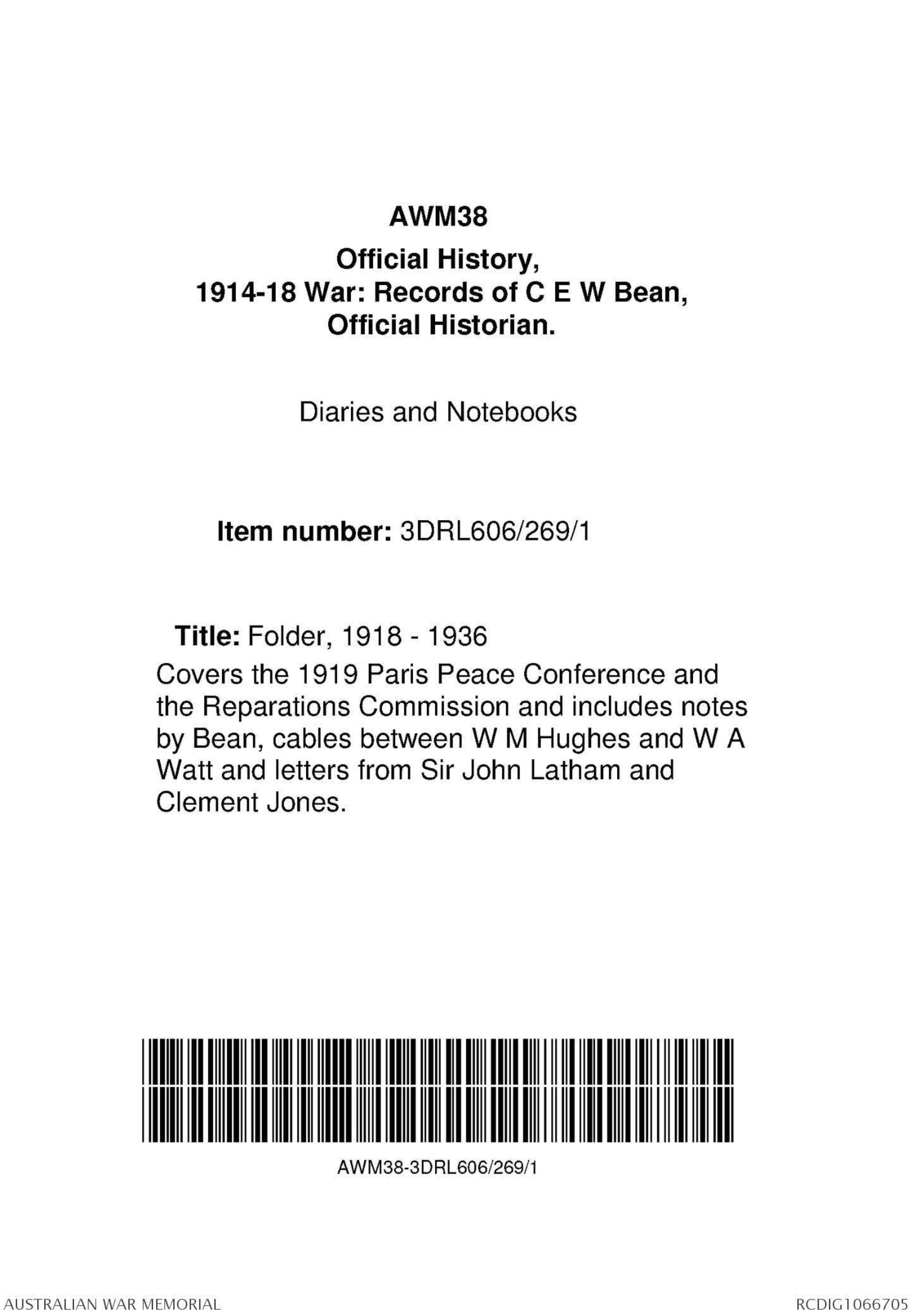
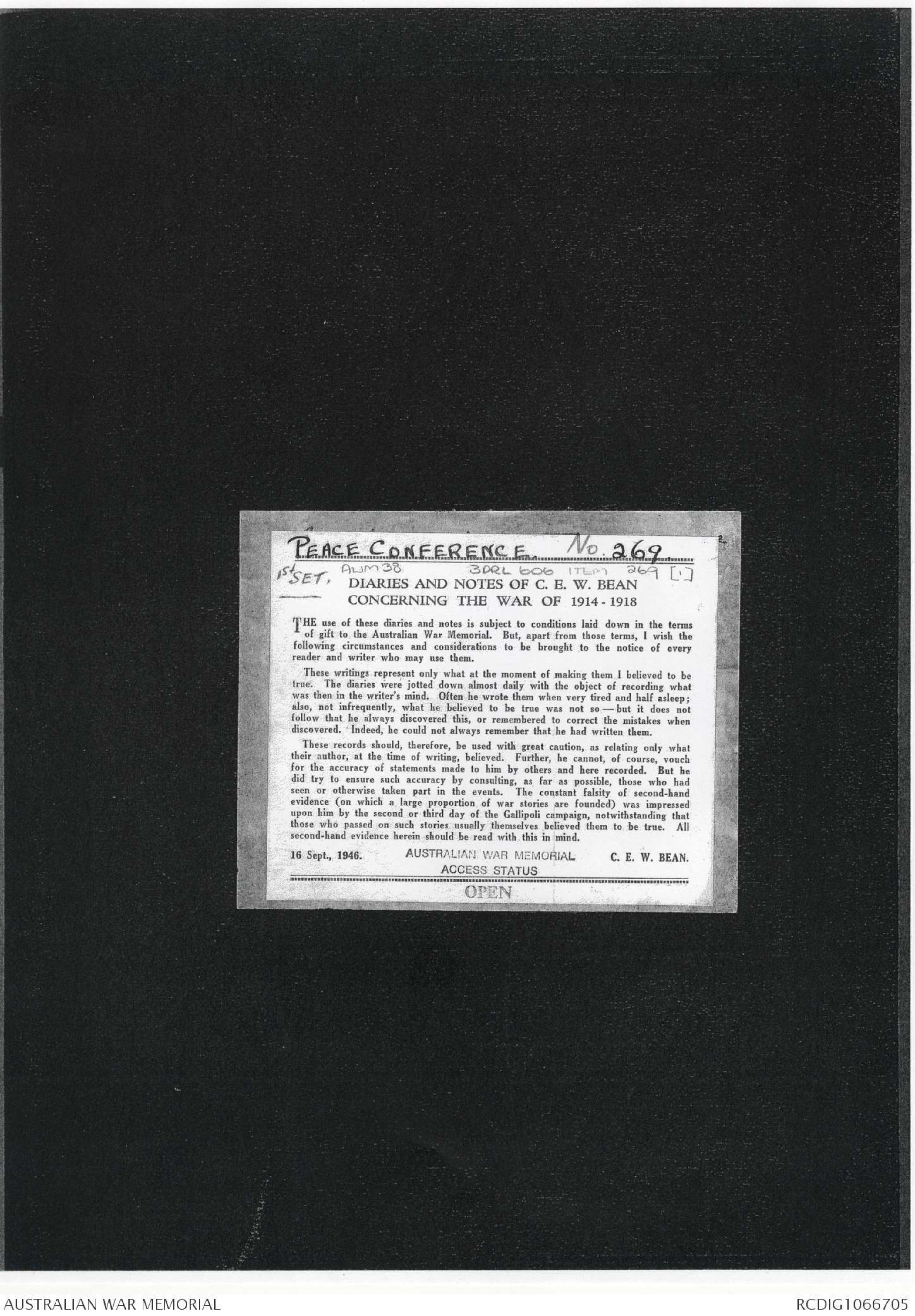
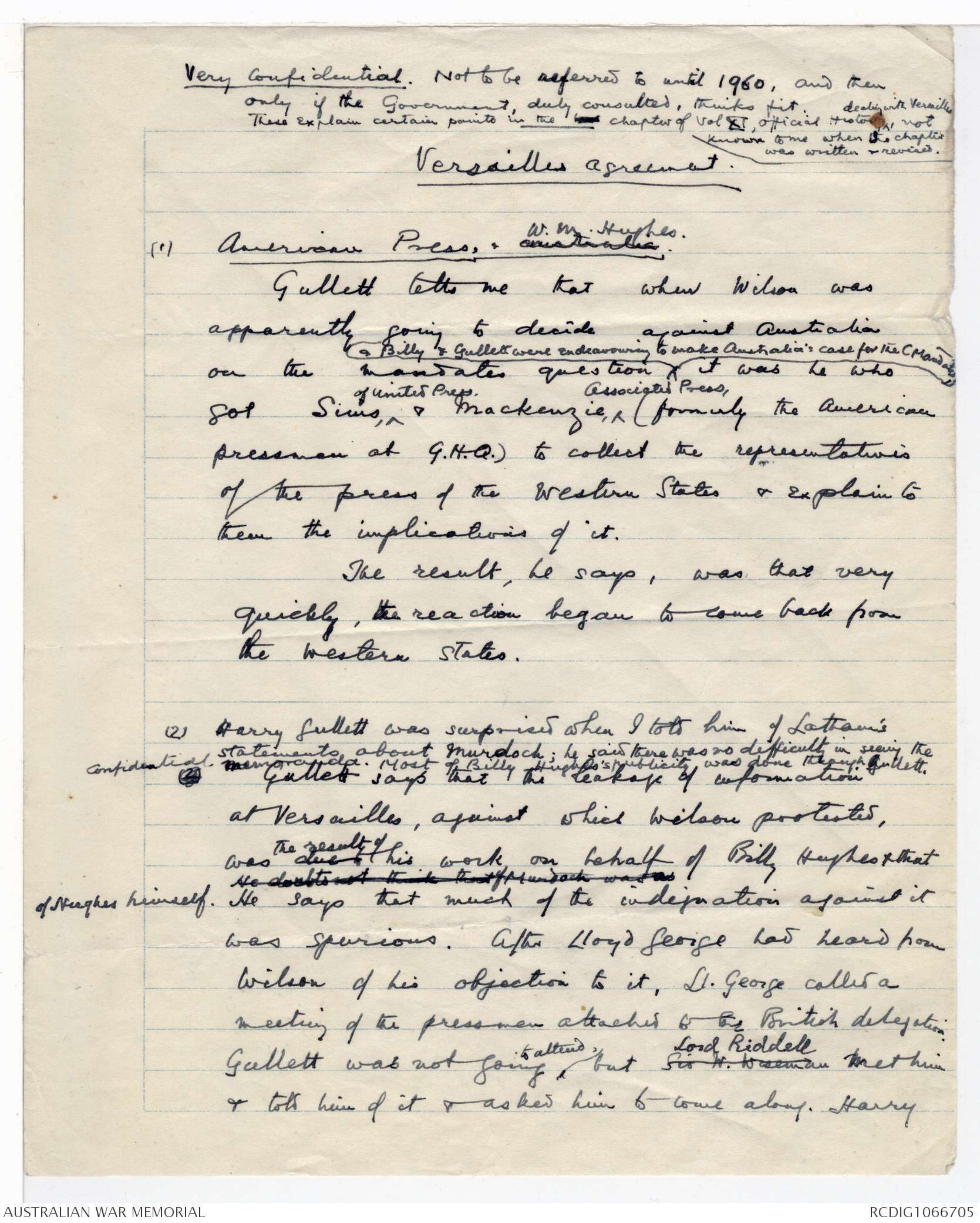
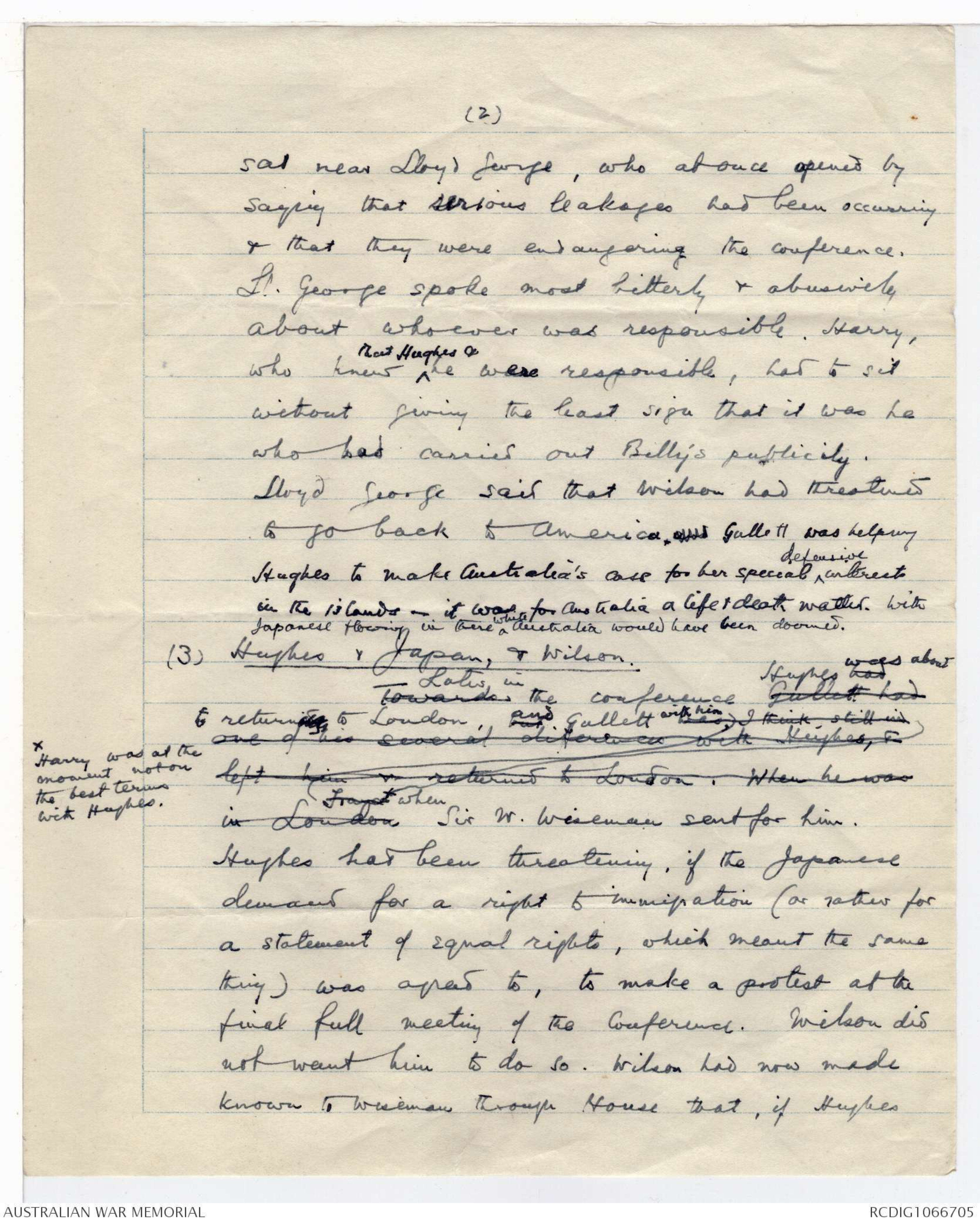
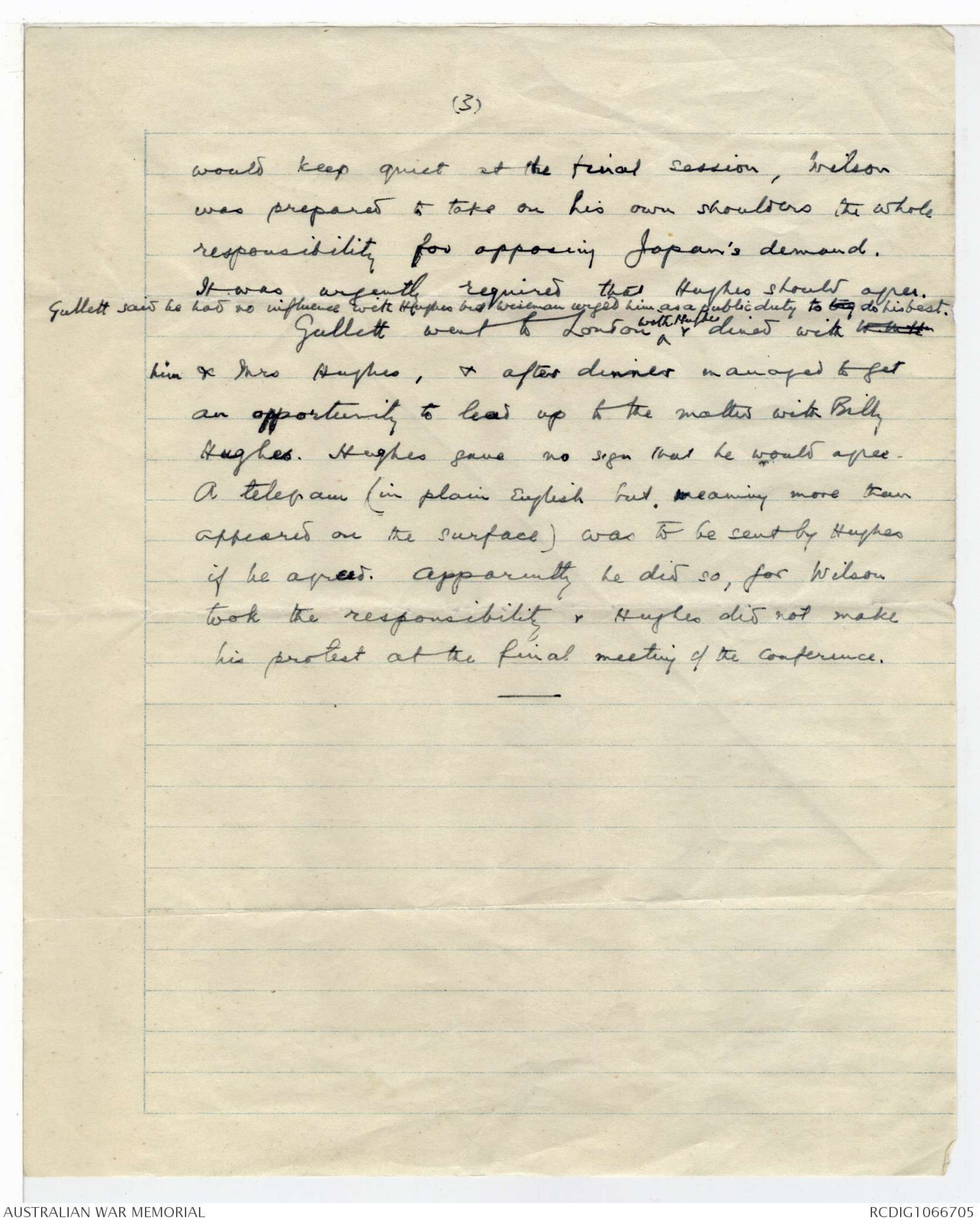
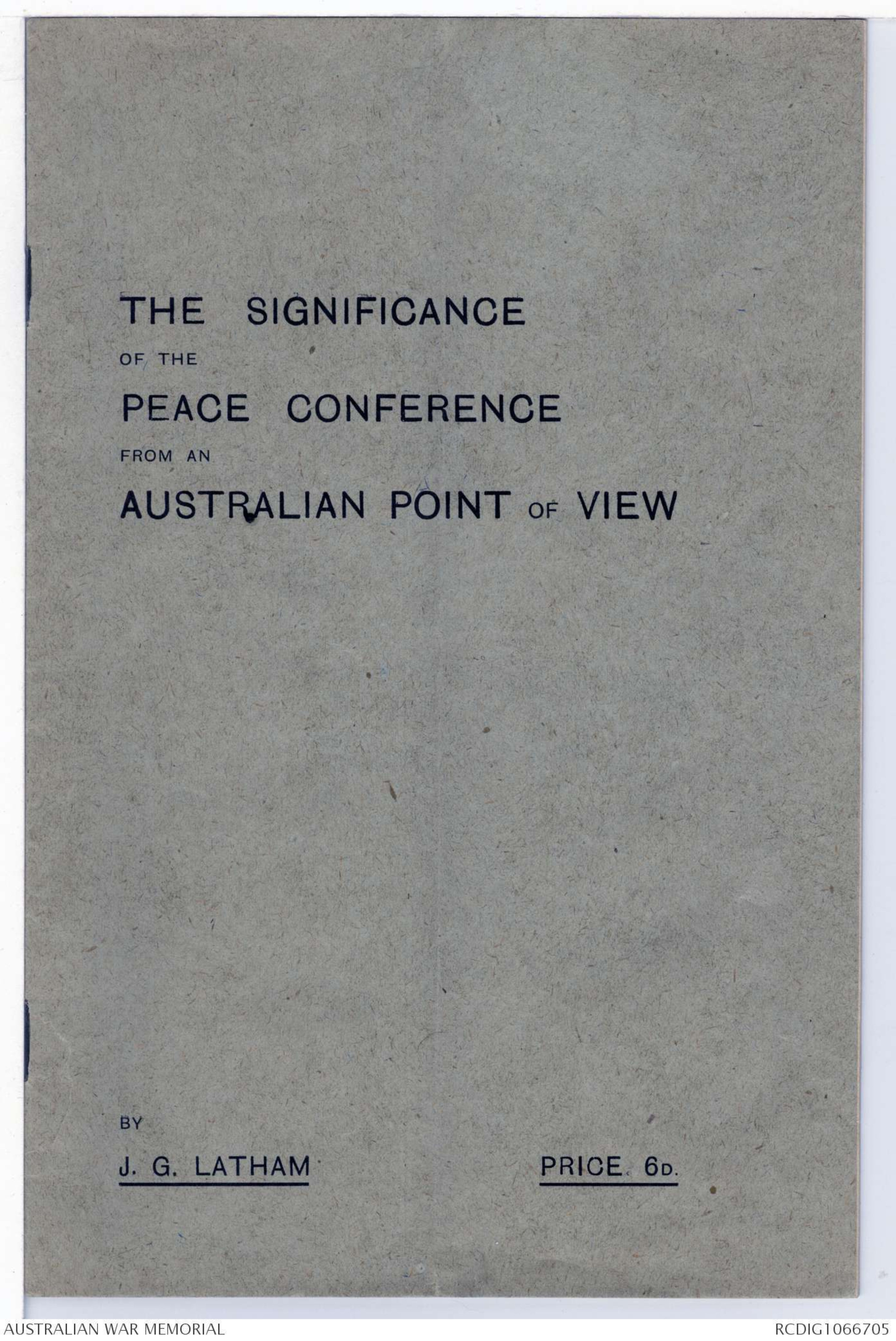
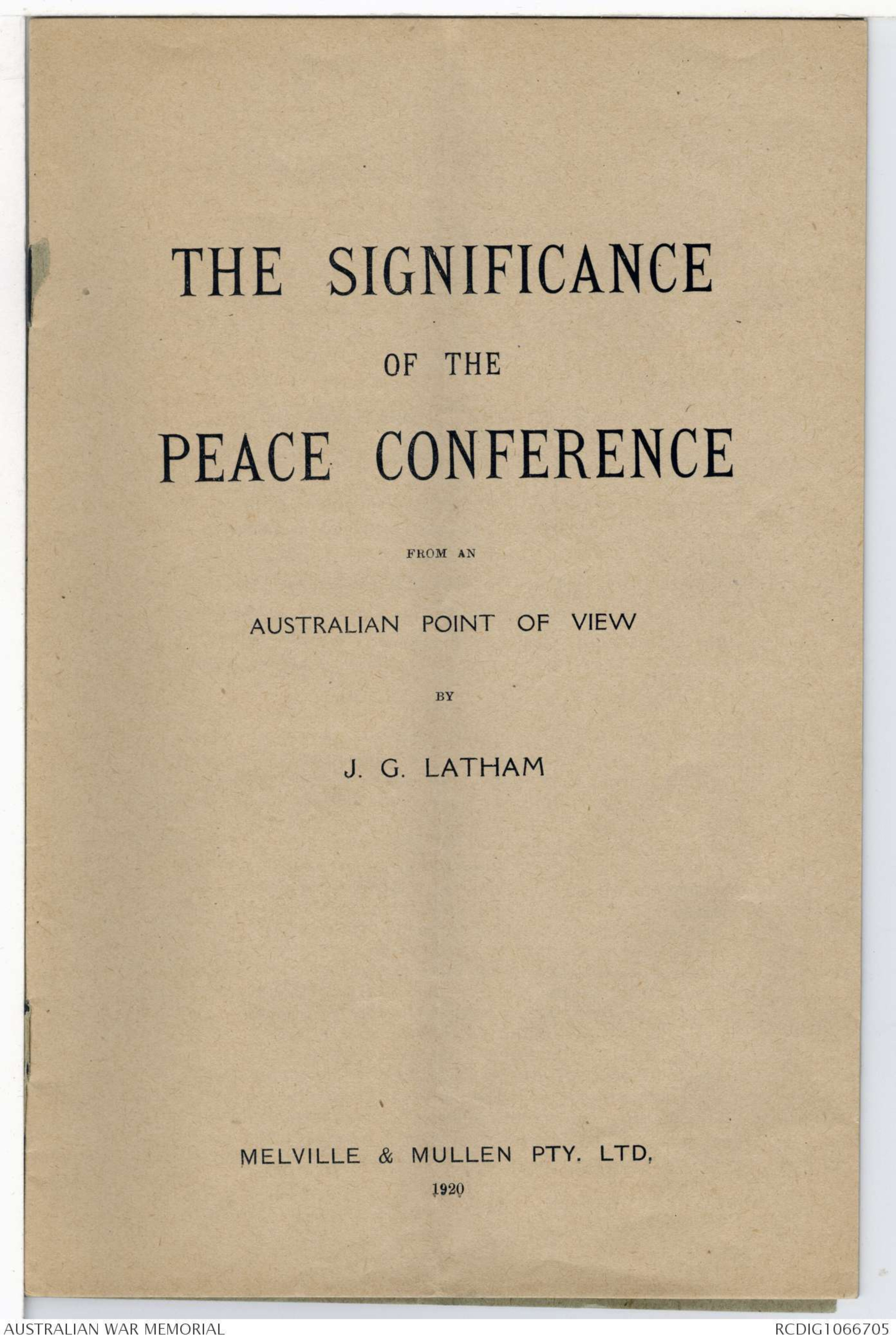
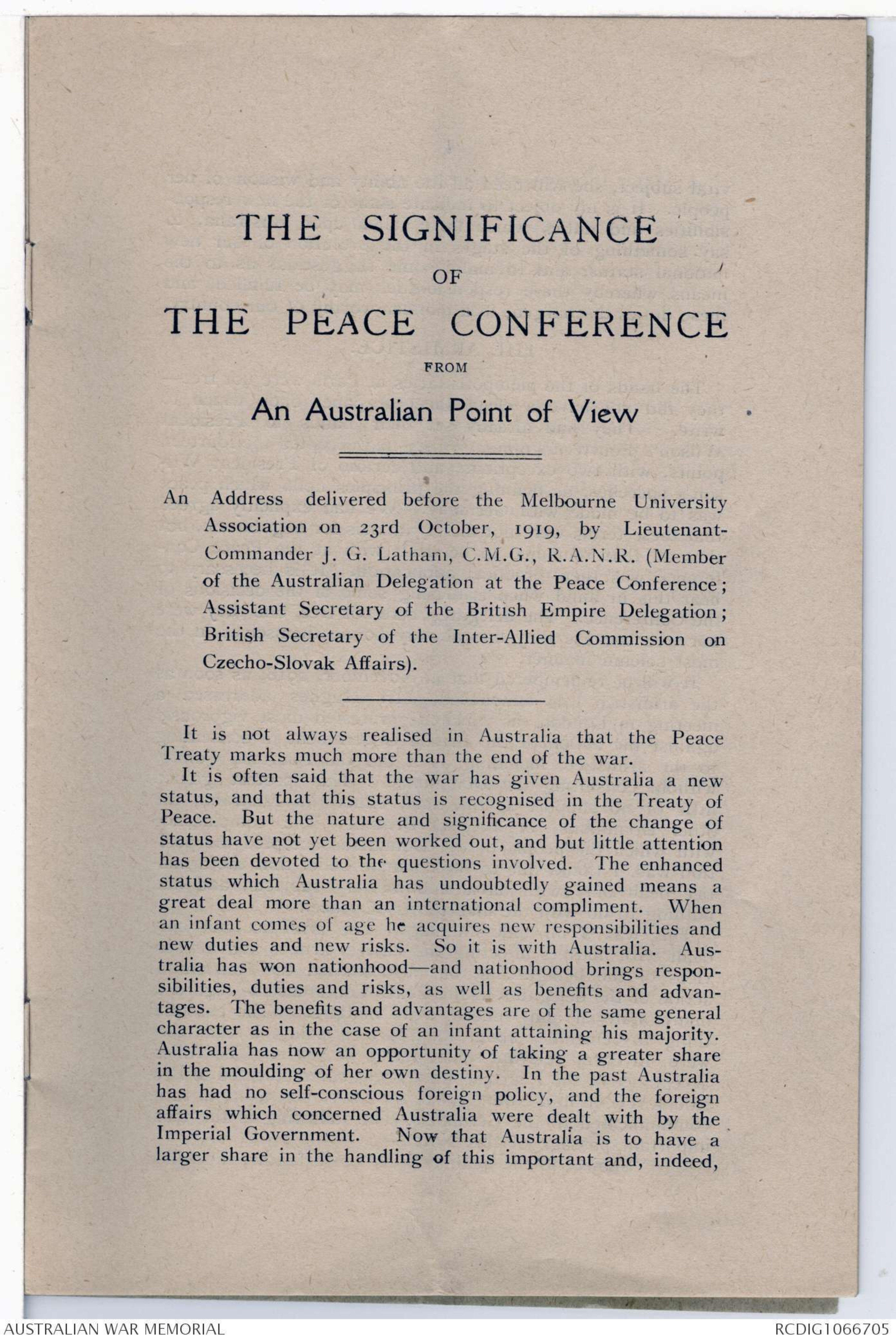
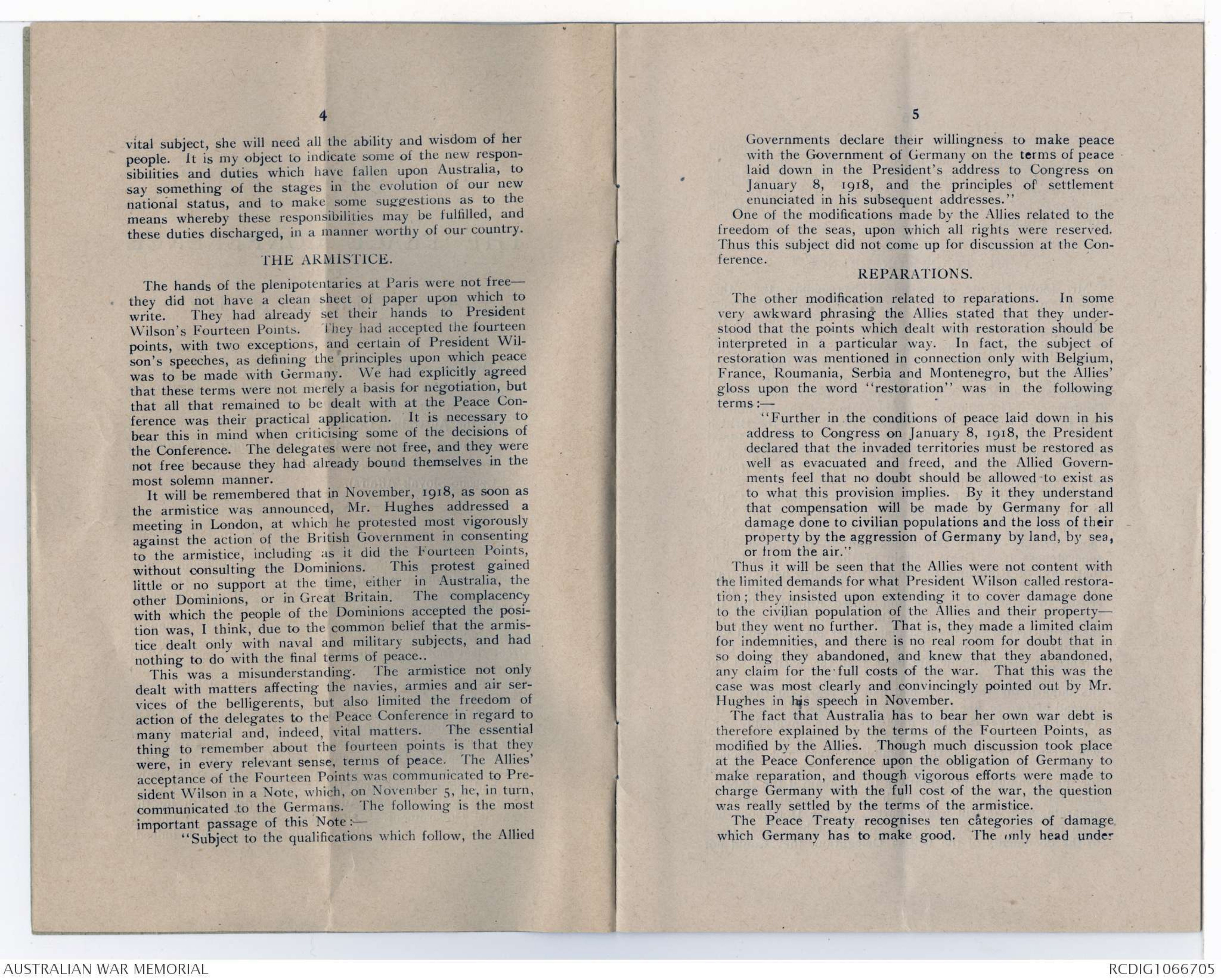
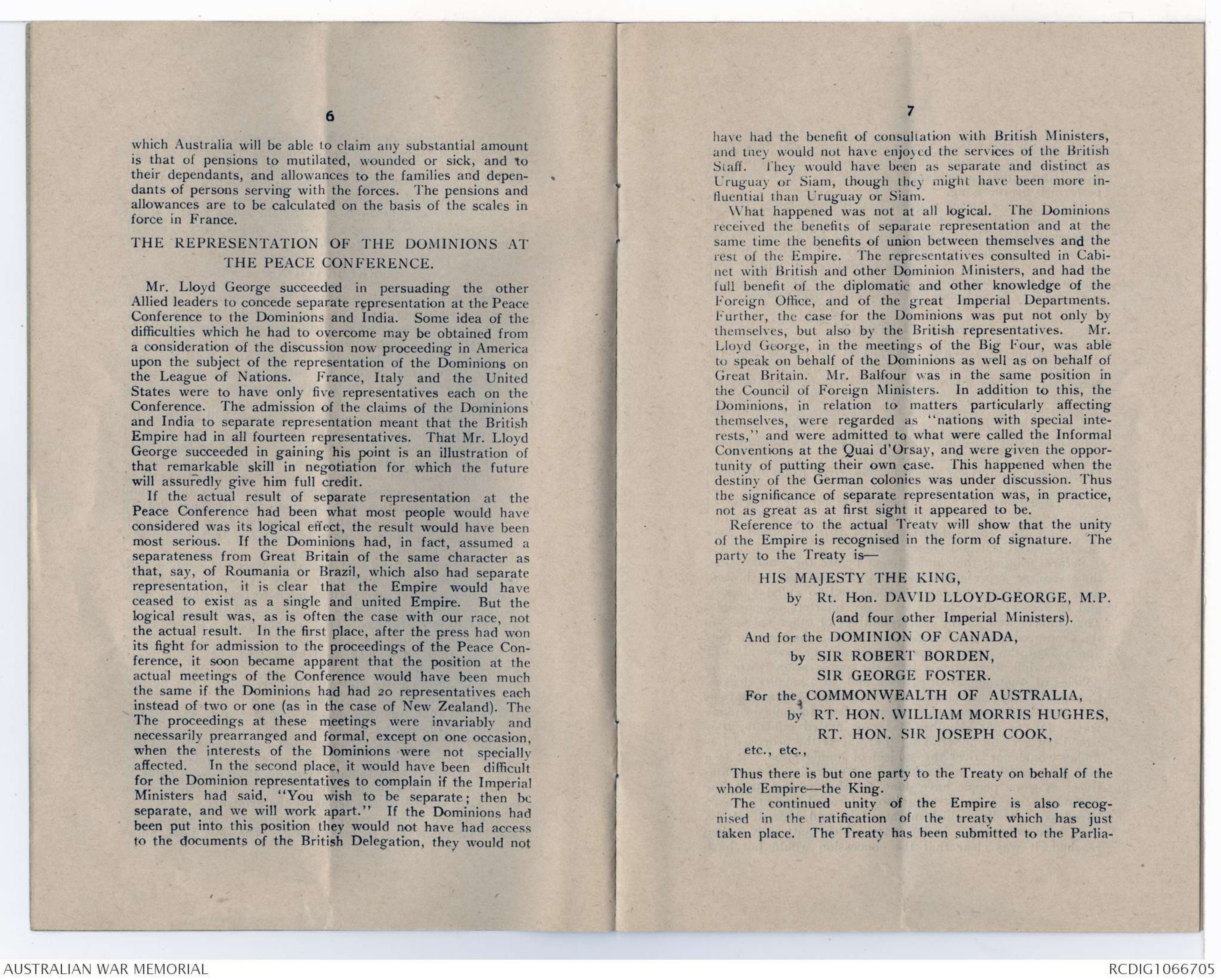
AWM38
Official History,
1914-18 War: Records of C E W Bean,
Official Historian.
Diaries and Notebooks
Item number: 3DRL606/269/1
Title: Folder, 1918 - 1936
Covers the 1919 Paris Peace Conference and
the Reparations Commission and includes notes
by Bean, cables between WM Hughes and WA
Watt and letters from Sir John Latham and
Clement Jones.
AWM38-3DRL606/269/1
PEACE CONFERENCE. NO.269
1ST SET. AWM38 3DRL606 ITEM 269[1]
DIARIES AND NOTES OF C. E. W. BEAN
CONCERNING THE WAR OF 1914-1918
THE use of these diaries and notes is subject to conditions laid down in the terms
of gift to the Australian War Memorial. But, apart from those terms, I wish the
following circumstances and considerations to be brought to the notice of every
reader and writer who may use them.
These writings represent only what at the moment of making them I believed to be
true. The diaries were jotted down almost daily with the object of recording what
was then in the writer’'s mind. Often he wrote them when very tired and half asleep;
also, not infrequently, what he believed to be true was not so —but it does not
follow that he always discovered this, or remembered to correct the mistakes when
discovered. Indeed, he could not always remember that he had written them.
These records should, therefore, be used with great caution, as relating only what
their author, at the time of writing, believed. Further, he cannot, of course, vouch
for the accuracy of statements made to him by others and here recorded. But he
did try to ensure such accuracy by consulting, as far as possible, those who had
seen or otherwise taken part in the events. The constant falsity of second-hand
evidence (on which a large proportion of war stories are founded) was impressed
upon him by the second or third day of the Gallipoli campaign, notwithstanding that
those who passed on such stories usually themselves believed them to be true. All
second-hand evidence herein should be read with this in mind.
AUSTRALIAN WAR MEMORIAL
16 Sept, 1946. AUSTRALIAN WAR MEMORIAL ACCESS STATUS OPEN C.E.W. BEAN.
Very confidential. Not to be referred to until 1960, and then
only if the Government, duly consulted, thinks fit.
These explain certain points in the [[last?]] Chapter of Vol [[XI ?]], official Histo?]] dealing with Versailles not known to me when the chapter
was written & [[reviewed?]].
Versailles agreement.
(1) American Press, & [[ illegible?]] W. M. Hughes.
Gullett telts me that when Wilson was
apparently going to decide against Australia
on the [[mandates?]] question
(& Billy & Gullett were endeavouring to make Australia's case for the C Mandates,)
it was he who
got Sims, of United Press & Mackenzie, Associated Press (formerly the American
pressman at G.H.Q.) to collect the representatives
of the press of the Western States & explain to
them the implications of it.
The result, he says, was that very
quickly, the reaction began to come back from
the Western States.
(2) Harry [[Gullett?]] was surprised when I told him of Latham's
statements, about Murdoch; he said there was no difficulty in seeing the
[*confidential*] memoranda. Most of Billy Hughes's publicity was done [[through?]] Gullett.
Gullett says that the leakage of information
at Versailles, against which Wilson [protects?]],
was due the result of his work on behalf of Billy Hughes & that
of Hughes himself. He doubts not think that of Murdoch [[wasnt?]]
He says that much of the [[indignation?]] against it
was spurious. After Lloyd George had heard from
Wilson of his objection to it, [[Lt.?]] George called a
meeting of the pressmen attached to [[the?]] British delegation.
to attend
Lord Riddell
Gallett was not going but Sir W. Wiseman met him
& told him of it & asked him to tome along. Harry
(2)
sat near Lloyd George, who at once opened by
sagny that serious leakages had been occurring
& that they were endangering the conference.
L. George spoke most bitterly & abusively
about whoever was responsible. Harry,
who knew that Hughes & he were responsible, had to sit
witout giving the last sign that it was he
who has carries out Billy's publicity.
Lloyd George said that Wilson had threatened
to go back to America. And Gallett was helping
Hughes to make Australia's case for her special defensive interest
in the islands [[&?]] it was for Anstialia a life & death matter. With
Japanest [[flowing?]] in there while Australia would have been doomed.
(3) Hughes & Japan, & Wilson.Towards Later in the conference Hughes was was about
to returning to London, and Gullett with him has, I think, still in
[*Harry was at the moment not on the best terms with Hughes*]
one of his several [[differences?]] with Hughes, &
left him and returned to London. When he was inLondon France when Sir W. Wiseman sent for him.
Hughes has been threatening, if the Japanese
demand for a right to [[immigration?]] ( or rather for
a statement of equal rights, which meant the same
thing) was agreed to, to make a protest at the
final full meeting of the Conference. Wilson did
not want him to do so. Wilson had now made
known to Wiseman through House that, if Hughes
(3)
would keep quiet at the final session, Wilson
was prepared 5 take on his own shoulders the whole
responsibility for opposing Japan's demand.
It was urgently that Hughes should agree.
Gullett saw he had no influence with Hughes but Wiseman urged him as a public duty to beg do his best.
Gullett went to London with Hughes and dined with [[W.Weston?]]
him & Mrs Hughes, & after dinner managed to get
an opportunity to lead up to the matter with Billy
Hughes. Hughes gave no sign that he would agree.
A telegam (in plain English but meaning more than
appeared on the surface) was to be sent by Hughes
if he agreed. Apparently he did so, for Wilson
took the responsibility & Huyles did not make
his protest at the final meeting of the conference.
THE SIGNIFICANCE
OF THE
PEACE CONFERENCE
FROM AN
AUSTRALIAN POINT OF VIEW
BY
J.G. LATHAM PRICE 6p
THE SIGNIFICANCE
OF THE
PEACE CONFERENCE
FROM AN
AUSTRALLAN POINT OF VIEW
BY
J. G. LATHAM
MELVILLE & MULLEN PTY. LTD,
1920
THE SIGNIFICANCE
OF
THE PEACE CONFERENCE
FROM
An Australian Point of View
An Address delivered before the Melbourne University
Association on 23rd October, 1919, by Lieutenant-
Commander J. G. Latham, C.M.G., R.A.N.R. (Member
of the Australian Delegation at the Peace Conference;
Assistant Secretary of the British Empire Delegation;
British Secretary of the Inter-Allied Commission on
Czecho-Slovak Affairs).
It is not always realised in Australia that the Peace
Treaty marks much more than the end of the war.
It is often said that the war has given Australia a new
status, and that this status is recognised in the Treaty of
Peace. But the nature and significance of the change of
status have not yet been worked out, and but little attention
has been devoted to the questions involved. The enhanced
status which Australia has undoubtedly gained means a
great deal more than an international compliment. When
an infant comes of age he acquires new responsibilities and
new duties and new risks. So it is with Australia. Aus-
tralia has won nationhood—and nationhood brings respon-
sibilities, duties and risks, as well as benefits and advan-
tages. The benefits and advantages are of the same general
character as in the case of an infant attaining his majority.
Australia has now an opportunity of taking a greater share
in the moulding of her own destiny. In the past Australia
has had no self-conscious foreign policy, and the foreign
affairs which concerned Australia were dealt with by the
Imperial Government.
Now that Australia is to have a
larger share in the handling of this important and, indeed,
4
vital subject, she will need all the ability and wisdom of her
people. It is my object to indicate some of the new respon-
sibilities and duties which have fallen upon Australia, to
say something of the stages in the evolution of our new
national status, and to make some suggestions as to the
means whereby these responsibilities may be fulfilled, and
these duties discharged, in a manner worthy of our country.
THE ARMISTICE.
The hands of the plenipotentaries at Paris were not free-
they did not have a clean sheet of paper upon which to
write. They had already set their hands to President
Wilson's Fourteen Points. They had accepted the fourteen
points, with two exceptions, and certain of President Wil-
son's speeches, as defining the principles upon which peace
was to be made with Germany. We had explicitly agreed
that these terms were not merely a basis for negotiation, but
that all that remained to be dealt with at the Peace Con-
ference was their practical application. It is necessary to
bear this in mind when criticising some of the decisions of
the Conference. The delegates were not free, and they were
not free because they had already bound themselves in the
most solemn manner.
It will be remembered that in November, 1918, as soon as
the armistice was announced, Mr. Hughes addressed a
meeting in London, at which he protested most vigorously
against the action of the British Government in consenting
to the armistice, including as it did the Fourteen Points,
without consuiting the Dominions. This protest gained
little or no support at the time, either in Australia, the
other Dominions, or in Great Britain. The complacency
with which the people of the Dominions accepted the posi-
tion was, I think, due to the common belief that the armis-
tice dealt only with naval and military subjects, and had
nothing to do with the final terms of peace..
This was a misunderstanding. The armistice not only
dealt with matters affecting the navies, armies and air ser-
vices of the belligerents, but also limited the freedom of
action of the delegates to the Peace Conference in regard to
many material and, indeed, vital matters. The essential
thing to remember about the fourteen points is that they
were, in every relevant sense, terms of peace. The Allies'
acceptance of the Fourteen Points was communicated to Pre-
sident Wilson in a Note, which, on November 5, he, in turn,
communicated to the Germans. The following is the most
important passage of this Note:-
"Subject to the qualifications which follow, the Allied
5
Governments declare their willingness to make peace
with the Government of Germany on the terms of peace
laid down in the President’s address to Congress on
January 8, 1918, and the principles of settlement
enunciated in his subsequent addresses."
One of the modifications made by the Allies related to the
freedom of the seas, upon which all rights were reserved.
Thus this subject did not come up for discussion at the Con-
terence.
REPARATIONS.
The other modification related to reparations. In some
very awkward phrasing the Allies stated that they under
stood that the points which dealt with restoration should be
interpreted in a particular way. In fact, the subject of
restoration was mentioned in connection only with Belgium,
France, Roumania, Serbia and Montenegro, but the Allies'
gloss upon the word "restoration" was in the following
terms:-
"Further in the conditions of peace laid down in his
address to Congress on January 8, 1918, the President
declared that the invaded territories must be restored as
well as evacuated and freed, and the Allied Govern-
ments feel that no doubt should be allowed to exist as
to what this provision implies. By it they understand
that compensation will be made by Germany for all
damage done to civilian populations and the loss of their
property by the aggression of Germany by land, by sea,
or from the air."
Thus it will be seen that the Allies were not content with
the limited demands for what President Wilson called restora-
tion; they insisted upon extending it to cover damage done
to the civilian population of the Allies and their property-
but they went no further. That is, they made a limited claim
for indemnities, and there is no real room for doubt that in
so doing they abandoned, and knew that they abandoned,
any claim for the full costs of the war. That this was the
case was most clearly and convincingly pointed out by Mr.
Hughes in his speech in November.
The fact that Australia has to bear her own war debt is
therefore explained by the terms of the Fourteen Points, as
modified by the Allies. Though much discussion took place
at the Peace Conference upon the obligation of Germany to
make reparation, and though vigorous efforts were made to
charge Germany with the full cost of the war, the question
was really settled by the terms of the armistice.
The Peace Treaty recognises ten categories of damage
which Germany has to make good. The only head under
6
which Australia will be able to claim any substantial amount
is that of pensions to mutilated, wounded or sick, and to
their dependants, and allowances to the families and depen-
dants of persons serving with the forces. The pensions and
allowances are to be calculated on the basis of the scales in
force in France.
THE REPRESENTATION OF THE DOMINIONS AT
THE PEACE CONFERENCE.
Mr. Lloyd George succeeded in persuading the other
Allied leaders to concede separate representation at the Peace
Conference to the Dominions and India. Some idea of the
difficulties which he had to overcome may be obtained from
a consideration of the discussion now proceeding in America
upon the subject of the representation of the Dominions on
the League of Nations. France, Italy and the United
States were to have only five representatives each on the
Conference. The admission of the claims of the Dominions
and India to separate representation meant that the British
Empire had in all fourteen representatives. That Mr. Lloyd
George succeeded in gaining his point is an illustration of
that remarkable skill in negotiation for which the future
will assuredly give him full credit.
If the actual result of separate representation at the
Peace Conference had been what most people would have
considered was its logical effect, the result would have been
most serious. If the Dominions had, in fact, assumed a
separateness from Great Britain of the same character as
that, say, of Roumania or Brazil, which also had separate
representation, it is clear that the Empire would have
ceased to exist as a single and united Empire. But the
logical result was, as is often the case with our race, not
the actual result. In the first place, after the press had wor
its fight for admission to the proceedings of the Peace Con-
ference, it soon became apparent that the position at the
actual meetings of the Conference would have been much
the same if the Dominions had had 20 representatives each
instead of two or one (as in the case of New Zealand). The
The proceedings at these meetings were invariably and
necessarily prearranged and formal, except on one occasion,
when the interests of the Dominions were not specially
affected. In the second place, it would have been difficult
for the Dominion representatives to complain if the Imperial
Ministers had said, "You wish to be separate; then be
separate, and we will work apart." If the Dominions had
been put into this position they would not have had access
to the documents of the British Delegation, they would not
7
have had the benefit of consultation with British Ministers,
and they would not have enjoyed the services of the British
Staff. They would have been as separate and distinct as
Uruguay or Siam, though they might have been more in-
fuential than Uruguay or Siam.
What happened was not at all logical. The Dominions
received the benefits of separate representation and at the
same time the benefits of union between themselves and the
rest of the Empire. The representatives consulted in Cabi-
net with British and other Dominion Ministers, and had the
full benefit of the diplomatic and other knowledge of the
Foreign Office, and of the great Imperial Departments.
Further, the case for the Dominions was put not only by
themselves, but also by the British representatives. Mr.
Lloyd George, in the meetings of the Big Four, was able
to speak on behalf of the Dominions as well as on behalf of
Great Britain. Mr. Balfour was in the same position in
the Council of Foreign Ministers. In addition to this, the
Dominions, in relation to matters particularly affecting
themselves, were regarded as "nations with special inte-
rests," and were admitted to what were called the Informal
Conventions at the Quai d'Orsay, and were given the oppor-
tunity of putting their own case. This happened when the
destiny of the German colonies was under discussion. Thus
the significance of separate representation was, in practice,
not as great as at first sight it appeared to be.
Reference to the actual Treaty will show that the unity
of the Empire is recognised in the form of signature. The
party to the Treaty is-
HIS MAJESTY THE KING,
by Rt. Hon. DAVID LLOYD-GEORGE, M.P.
(and four other Imperial Ministers).
And for the DOMINION OF CANADA,
by SIR ROBERT BORDEN,
SIR GEORGE FOSTER.
For the COMMONWEALTH OF AUSTRALIA,
by RT. HON. WILLLAM MORRIS HUGHES
RT. HON. SIR JOSEPH COOK,
etc., etc.,
Thus there is but one party to the Treaty on behalf of the
whole Empire—the King.
The continued unity of the Empire is also recog-
nised in the ratification of the treaty which has just
taken place. The Treaty has been submitted to the Parlia-
 Sam scott
Sam scottThis transcription item is now locked to you for editing. To release the lock either Save your changes or Cancel.
This lock will be automatically released after 60 minutes of inactivity.